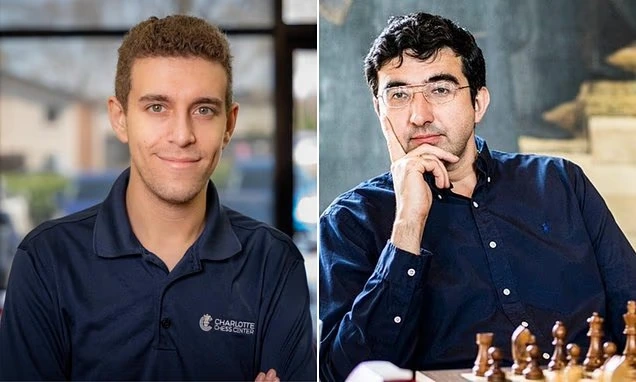The International Chess Federation (FIDE) has announced a formal ethics review into former world champion Vladimir Kramnik, following weeks of public backlash over his repeated cheating accusations and the tragic death of Grandmaster Daniel Naroditsky.
The statement, published on X (formerly Twitter) by FIDE President Arkady Dvorkovich, marks the strongest response yet from the chess world’s governing body amid growing calls for accountability.
“Human life and dignity are fundamental values shared by all of us,” Dvorkovich wrote. “While we hold deep respect and love for the game of chess that unites our community, these values must always come first.”
“Therefore, I, along with the FIDE Management Board, will formally refer all relevant public statements made by GM Vladimir Kramnik — both before and after the tragic death of GM Daniel Naroditsky — to the FIDE Ethics and Disciplinary Commission for independent consideration.”
A Growing Storm
The move comes after a series of increasingly controversial posts by Kramnik, the 14th world chess champion, who has for months accused several prominent grandmasters of using computer assistance in online play.
Kramnik began raising suspicions in late 2023, first targeting anonymous accounts before gradually naming elite players, citing what he called “statistical anomalies” in their move accuracy during online tournaments such as Titled Tuesday on Chess.com.
Among those he has publicly questioned are Daniel Naroditsky, David Navara, Matthias Bluebaum, and Vietnamese grandmasters Le Quang Liem and Le Tien Minh. In each case, Kramnik presented self-compiled data suggesting unnatural precision in certain games — but without providing verifiable evidence or submitting formal complaints to tournament organizers.
Naroditsky, a widely respected commentator, streamer, and grandmaster, was found dead earlier this month. While no direct link between his death and Kramnik’s posts has been established, many players and fans felt that the Russian’s relentless public campaign had deepened the psychological toll on the chess community.
After Naroditsky’s death, screenshots circulated showing Kramnik sharing private messages alleging that the American grandmaster “looked like he was on serious drugs” during a livestream — fueling outrage and grief online.
Outcry From the Chess Community
The backlash was immediate. Grandmasters, commentators, and fans across platforms called on Kramnik to stop what they viewed as defamation. Others demanded FIDE intervene.
FIDE Director General Emil Sutovsky had earlier issued a carefully worded response, saying that while fair play remained a top priority, the tone of discourse had become dangerous. In a later clarification, Sutovsky admitted that “FIDE also could and should have done better” in protecting players from online harassment.
“We need to look into our policies,” Sutovsky wrote, “and probably not wait for a formal complaint, but step in and protect the people in such situations. Very difficult to balance it all, but we will do our utmost.”
The FIDE president’s statement on Tuesday appears to be a direct follow-up to that commitment.
Formal Investigation
By referring Kramnik’s conduct to the Ethics and Disciplinary Commission, Dvorkovich effectively launches an official investigation into whether the former champion violated the federation’s code of ethics.
The commission, which operates independently from FIDE’s management board, has the power to issue warnings, suspend membership rights, or even ban individuals from participating in official events — though such extreme measures are rare.
The decision covers all of Kramnik’s “relevant public statements,” including those made before Naroditsky’s passing, and could encompass posts about multiple grandmasters.
Dvorkovich acknowledged Kramnik’s towering achievements — including his 2000 world title victory over Garry Kasparov and his reputation as one of chess’s greatest defenders — but emphasized that such legacy comes with responsibility.
“The same high standards that accompany great achievements also confer a responsibility to uphold the principles of fairness and respect,” he said. “We all share responsibility for ensuring that our sport remains a space of integrity, respect, and humanity.”
Not FIDE’s First Involvement
This is not the first time FIDE has publicly addressed the Kramnik controversy.
In June 2025, the federation released a statement responding to tensions between Kramnik and Czech GM David Navara, after Kramnik filed a defamation lawsuit against Navara for questioning his allegations.
That earlier statement struck a delicate balance: acknowledging that Kramnik’s proposed “statistical methods” for detecting cheating “deserve careful review,” while warning that “the way Mr. Kramnik presents his points brings a lot of harm to the chess community.”
FIDE added that Navara was “a paragon of fair play” and urged Kramnik to withdraw the lawsuit, calling it “a morally justified step” that would be “welcomed by the broader chess world.”
The current development suggests that Kramnik ignored those warnings — and that FIDE now feels compelled to act.
Divided Reactions
Kramnik’s supporters argue that his crusade, however abrasive, was motivated by a genuine concern for fair play. They point to past scandals — including the 2022 cheating controversy involving Hans Niemann and Magnus Carlsen — as evidence that transparency and statistical analysis are necessary for the sport’s integrity.
Critics, however, accuse him of waging a one-man witch hunt. They argue that Kramnik’s reliance on unverified “stats” and his tendency to single out individuals without due process have damaged reputations and fostered an atmosphere of paranoia.
On social media, one comment directed at FIDE read:
“You must protect other players who were accused by Kramnik — especially David Navara — before it’s too late.”
What Comes Next
The Ethics and Disciplinary Commission will now decide whether Kramnik’s actions constitute misconduct under FIDE’s ethical code. The process typically involves reviewing evidence, interviewing involved parties, and issuing a public verdict.
As of now, Kramnik has not responded directly to FIDE’s new announcement. His most recent posts continue to reference a so-called “#chessmafia,” insisting that there are powerful interests suppressing fair play discussions.
Dvorkovich’s statement signals that FIDE is prepared to confront that rhetoric head-on, prioritizing the well-being of players over the reputation of even its most legendary figures.
I’m the senior editor of Attacking Chess, a keen chess player, rated above 2300 in chess.com. You can challenge me or asking questions at Chess.com.

